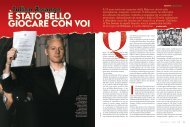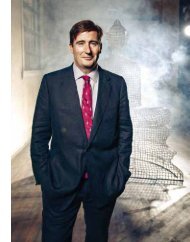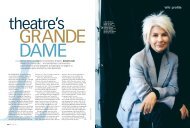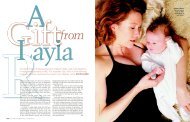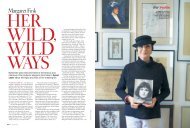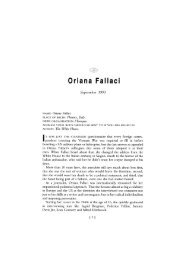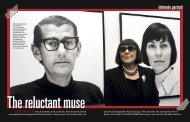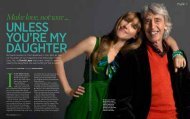eve kantor - David Leser
eve kantor - David Leser
eve kantor - David Leser
Create successful ePaper yourself
Turn your PDF publications into a flip-book with our unique Google optimized e-Paper software.
eEVE KANTOR DOESN’T normally give interviews. As<br />
the niece of Rupert Murdoch and the grand-daughter of Dame<br />
Elisabeth, she is too keenly aware of how her words might be<br />
misused as weapons to damage her family, or more particularly,<br />
her famous uncle. She would hate to see that happen. Besides<br />
which, her natural disposition is for privacy, the kind that life<br />
on a 5000-hectare farm in western Victoria allows her and her<br />
husband and their four young children.<br />
These aren’t normal times, how<strong>eve</strong>r – and that’s why Eve<br />
Kantor has agreed to something she wouldn’t normally do.<br />
“I’ve decided to talk publicly,” she tells The Weekly, “because<br />
the issue of global warming is so urgent, so desperate, that you<br />
have to do what<strong>eve</strong>r is in your power. Even if what you do has<br />
only a minimal impact, then you have to do it.”<br />
Until about five years ago, Eve and her husband, Mark Wootton,<br />
would have described themselves as climate change sceptics. They<br />
listened to the doubters. They hoped for the best. Today, they can see<br />
what has happened to the once lush pasturelands and prime merino<br />
country of western Victoria. They can see the stripped, straw fields,<br />
the denuded soil, the empty dams and creeks, the dark, scudding<br />
clouds that refuse to blink. And they are convinced that this is not<br />
just part of a cyclical weather pattern involving inevitable drought<br />
periods, but rather a fundamental change in the climate itself. They<br />
have read the weight of evidence from the scientific community<br />
and, as Eve says now, “It’s ridiculous to deny it any longer.<br />
“I feel a bit of a zealot on this,” she continues. “We all need<br />
to do what we can, but the urgent change that is needed is from<br />
government and large-scale carbon-emitting industries. They<br />
absolutely have to do their bit.”<br />
Eve and Mark have, for the past few years, been droughtproofing<br />
their farm, minimising water use, creating wildlife corridors,<br />
planting with native trees and grasses, restoring the wetlands and<br />
using the land as a sink to offset carbon dioxide emissions.<br />
More importantly, though, for its wider implications, they<br />
have also set up the Climate Institute, which aims to raise<br />
public awareness about the dangers of global warming and<br />
failing to act now.<br />
Established in 2005 with a $10million grant from Eve’s late younger<br />
brother, Tom, the institute has already produced a ground-breaking<br />
report that brought together for the first time 16 Australian-based <br />
2 | WW MARCH 2007 WW MARCH 2007 | WOMEN UNITE TO<br />
SAVE<br />
OUR<br />
<br />
Global warming has become<br />
such a pressing issue that, as<br />
governments fail to act, individual<br />
Australians are being galvanised<br />
into action in a bid to help save<br />
the planet, reports <strong>David</strong> <strong>Leser</strong>.<br />
PLANET<br />
3<br />
PHOTOGRAPHY BY ROBIN SHARROCK.<br />
WW | inspiring<br />
“WE ALL NEED TO<br />
DO WHAT WE CAN,<br />
BUT THE URGENT<br />
CHANGE THAT IS<br />
NEEDED IS FROM<br />
GOVERNMENT AND<br />
LARGE-SCALE<br />
CARBON-EMITTING<br />
INDUSTRIES.”<br />
EVE KANTOR<br />
Farmer and Climate<br />
Institute campaigner
“IT’S QUITE SAD TO<br />
ME THAT THE HUGE<br />
BOOM IN HOUSING IN<br />
WA HAS NOT RESULTED<br />
IN HOUSES BEING BUILT<br />
WITH THE CHANGING<br />
ENVIRONMENT IN MIND.”<br />
JANET HOLMES A COURT<br />
Businesswoman<br />
religious faiths united in their concerns. In<br />
a divisive age such as this, the Common<br />
Belief Report was a remarkable document.<br />
Many Australians<br />
have long had<br />
a sense of<br />
foreboding.<br />
We’ve sensed<br />
something was<br />
wrong mainly<br />
because of that precious resource we’ve<br />
long taken for granted. Water.<br />
For the first time in our history, there is<br />
an emergency in the water supply affecting<br />
both the bush and the city, one that is<br />
creating a common purpose between diverse<br />
communities, not to mention a possible<br />
new bipartisanship among some politicians.<br />
(Last month, the federal Opposition leader<br />
Kevin Rudd upped the ante on the Howard<br />
government’s $10billion plan to buy out<br />
irrigators and take over the Murray-Darling<br />
Basin, by calling for a national summit on<br />
climate change.) It no longer requires – if<br />
you live in the city – a leap of imagination<br />
to understand why a proud but broken man<br />
might walk off his land, leave his family<br />
behind and take his own life. (An Australian<br />
farmer kills himself <strong>eve</strong>ry four days.)<br />
Cities such as Adelaide, with a million<br />
people plus, are now in the grip of their own<br />
fully-fledged water crisis. Perth, Brisbane,<br />
Melbourne and Sydney are not faring much<br />
better. Towns throughout regional Australia<br />
have already begun to truck in water.<br />
And in response to the growing calamity,<br />
women around the country have responded<br />
as n<strong>eve</strong>r before. During The Weekly’s<br />
four-week investigation into this issue, it<br />
has been staggering – and reassuring – to<br />
learn just how many women and women’s<br />
groups have formed in response to the crisis,<br />
networks within networks, overlapping<br />
church, community and P&C groups,<br />
housewives and small businesswomen,<br />
philanthropists and entrepreneurs, lawyers,<br />
scientists and bankers, rich and poor, Right<br />
and Left, conservative and progressive.<br />
“The problem is very serious,” says<br />
the Australian Conservation Foundation’s<br />
Monica Richter. “We need to act within the<br />
next 10 years to dramatically cut greenhouse<br />
pollution, otherwise there is a very big chance<br />
of losing the things that are dear to us.”<br />
The names of iconic Australian<br />
destinations roll off her tongue: the Great<br />
Barrier Reef, the wetlands and rainforests<br />
of the Daintree, the Australian snowfields,<br />
Kakadu … all partially gone or destroyed<br />
within our children’s lifetimes – if not our<br />
own – if greenhouse gas emissions are not<br />
drastically reduced.<br />
Monica’s stark warnings are based<br />
on indisputable evidence showing direct<br />
correlation between the warming of the<br />
planet and the amount of carbon dioxide<br />
being spewed into the atmosphere, in<br />
other words, human activity.<br />
At the advent of the Industrial Revolution,<br />
there were 280 parts per million (ppm)<br />
of carbon dioxide concentration in the<br />
atmosphere compared to 383ppm today.<br />
By the end of the century, that l<strong>eve</strong>l is<br />
projected to be 750ppm, a hellish figure that<br />
would bring with it six degrees of warming.<br />
“Even two degrees will be catastrophic<br />
for many people,” she says. “It will affect<br />
so many people that I don’t think we can<br />
<strong>eve</strong>n fathom what it will be like. The<br />
difference between now and the last ice<br />
age was only five degrees. We don’t<br />
have a lot of wiggle room. We are now<br />
at the 11-and-a-half-hour moment.”<br />
There was a time when an<br />
intelligent, thoughtful<br />
woman like Monica<br />
Richter might have been<br />
dismissed by some as a<br />
“greenie”. Today, her<br />
views are taken with the<br />
utmost seriousness by leading companies,<br />
which, together with the ACF, formed<br />
the Australian Business Roundtable on<br />
Climate Change last year. (The Roundtable<br />
includes BP Australia, Origin Energy, Swiss<br />
Re, Visy Industries, Westpac and Insurance<br />
Australia Group (IAG), organisations<br />
that collectively employ 40,000 people<br />
and reach into nearly 100 per cent of<br />
Australian households.)<br />
Sam Mostyn from IAG, the country’s<br />
biggest insurance organisation, beli<strong>eve</strong>s<br />
one of the unique approaches of the<br />
Roundtable was to treat environmental<br />
groups with respect. “We weren’t going to<br />
turn into activists ourselves, but we needed<br />
to build a case for action on climate<br />
change based on good science.”<br />
And what the Roundtable concluded was<br />
that, by failing to act now, Australia was<br />
putting at risk its $32billion-a-year climatedependent<br />
tourism industry, its $17billiona-year<br />
livestock export industry and the<br />
future of the entire Murray-Darling Basin.<br />
Conversely, by putting a price on carbon<br />
today, by reducing greenhouse emissions<br />
by 60 per cent by 2050 and by investing<br />
as much as $30billion in breakthrough<br />
technologies, Australia could significantly<br />
reduce its vulnerability to climate change.<br />
And it could do so while achieving a l<strong>eve</strong>l<br />
of economic growth only slightly lower<br />
than if it were to do nothing: 2.1 per cent<br />
per annum as opposed to 2.2 per cent.<br />
“The effect on GDP would be so<br />
minimal that it would be unbelievable for<br />
us not to act,” Sam Mostyn says.<br />
As the AFL’s first female commissioner,<br />
Sam Mostyn is credited with helping<br />
transform the culture within our largest<br />
insurance group. She understands the<br />
way businessmen in particular tend to<br />
come at problems like global warming.<br />
They want to bring about structural<br />
change, capture new markets and, of<br />
course, make money.<br />
Women, on the other hand, tend to be<br />
more concerned with the finer details of<br />
life: the raising of children, the preparation<br />
of meals, the choice of which product to<br />
buy or not to buy. They are constantly<br />
FACT: WATERFRONT PROPERTIES – CANAL ESTATES, BEACHFRONTS, PORT<br />
FACILITIES – ARE AT RISK OF BEING DESTROYED OVER TIME BY RISING SEA LEVELS.<br />
assessing – without necessarily realising<br />
it – what a sustainable future, what a<br />
sustainable planet, might look like.<br />
“If you bear children, you think about<br />
the future,” she says. “And that’s what<br />
women are doing. Thinking about the future.<br />
All across Australia, they are coming<br />
together in all sorts of ways to help save<br />
the planet. And they’re talking in tough<br />
language about what used to be seen as a<br />
soft issue. They are saying – and this is from<br />
housewives through to businesswomen –<br />
‘We are going to sell our family car and<br />
buy a Prius [hybrid petrol and electricallyrun<br />
car], or we’re going to switch to<br />
GreenPower, or we’re going to have<br />
showers lasting only three minutes’.”<br />
Kate Mannix is an example in point.<br />
A self-described conservative mother-offour<br />
living in Sydney’s north-west, she is<br />
setting up a new national organisation<br />
called Mothers Against Climate Change.<br />
“Mothers have n<strong>eve</strong>r organised<br />
themselves as a political force to achi<strong>eve</strong><br />
change before,” she says. “But the thing<br />
about climate change – and this makes<br />
me very cross – is that women will be the<br />
ones who will have to accommodate the<br />
completely predictable changes that will<br />
occur in their lives because of it.<br />
“And they’ll be doing it while the<br />
decision makers [mostly men] sit in their<br />
air-conditioned offices and say: ‘Isn’t<br />
this dreadful, all those Pacific Islanders<br />
drowning?’ <strong>eve</strong>n though we knew this<br />
was going to happen.<br />
“My job as a mother is to make<br />
sure my children stay alive, so I think<br />
we should all be very cross that our<br />
ability to feed our children, to produce <br />
4 | WW MARCH 2007 WW MARCH 2007 | 5<br />
PHOTOGRAPHY BY FRANCES ANDRIJICH.
a healthy environment, to give them<br />
clean water or any water at all, is now<br />
really under threat.”<br />
With her flaming<br />
red hair and<br />
alluring<br />
presence,<br />
Sydney motherof-four<br />
Natalie<br />
Isaacs looks<br />
more like a figure out of a Raphael painting<br />
than a woman trying to spread a global,<br />
humanitarian message. Yet that’s what<br />
this highly successful chief executive of<br />
the Natalie range of cosmetics is trying to<br />
do: raise awareness about climate change<br />
by parlaying her skills from the beauty<br />
industry into community action.<br />
Together with friend Michelle Grosvenor,<br />
she has launched Climate Coolers, a national<br />
women’s organisation devoted to getting<br />
householders to cut down on their carbon<br />
dioxide emissions.<br />
“Michelle has lived and breathed<br />
activism,” Natalie explains, on a day<br />
when 600,000 hectares of bushland are<br />
burning out of control in the so-called<br />
Garden State of Victoria. “I have been in<br />
the cosmetics industry, but I have talked<br />
to thousands of women about relaxation,<br />
what to do to be beautiful on the inside as<br />
well as out. And I realised that I could shift<br />
all that and be as passionate about climate<br />
change as I have been about beauty products.<br />
Same skills, different message.”<br />
Natalie and Michelle’s plan is to help<br />
train a virtual army of women to fan out<br />
across the country – along the lines of<br />
the Tupperware brigade back in the<br />
1950s – equipped with a six-pack of<br />
long-life, low-energy light globes and a<br />
water-saving showerhead worth about $100.<br />
Working with the environmental<br />
group Easy Being Green, the women<br />
will aim to get each household to install<br />
the equipment (with help if necessary) so<br />
as to reduce their energy and water bills<br />
by $150 a year. If one million homes took<br />
up this option, it would cut the amount of<br />
carbon dioxide in the atmosphere by one<br />
million tonnes a year, equivalent to removing<br />
300,000 cars from the roads permanently.<br />
“As ordinary people, we have enormous<br />
power … if we choose to act,” she says.<br />
And that’s just in the home. Think about,<br />
as Melbourne mother Clare Cannon has been<br />
doing for years, what the effect would be if<br />
<strong>eve</strong>ry school in the country signed on to the<br />
Victoria-initiated Australian Sustainable<br />
Schools initiative and committed itself to<br />
sharp reductions in water usage, greenhouse<br />
gas emissions and solid waste output,<br />
as well as a program of installing solar<br />
panels and tree planting.<br />
Already 1000 schools nationally have<br />
done it, including St Catherine’s, Clare’s own<br />
daughters’ school in Toorak, Melbourne.<br />
“There’s been a big turnaround this year,”<br />
the school principal, Laraine Sharr, told<br />
The Weekly. “All the girls have become<br />
more empowered, more aware.”<br />
Now think about what it would look<br />
like if the whole country began to respond<br />
in similar fashion – from households through<br />
to industry through to government.<br />
Instead of continuing to invest heavily<br />
in polluting industries, such as coal-fired<br />
electricity, instead of planning to increase<br />
our greenhouse emissions by 22 per cent<br />
in the next 15 years, over and above 1990<br />
figures, instead of refusing to ratify the Kyoto<br />
Protocol as 166 other nations have seen fit<br />
to do, Australia could begin to seriously<br />
embrace a broad range of cleaner, non-nuclear<br />
technologies, such as carbon storage, wind<br />
power, geothermal, solar thermal, solar<br />
hydrogen, biomass and the construction of<br />
cutting-edge natural gas plants. (Australia<br />
has 100 years of proven natural gas reserves<br />
available and by 2030 will produce nearly<br />
3 per cent of the world’s supplies.)<br />
Imagine solar panels and glazing in<br />
<strong>eve</strong>ry home. Rainwater tanks. Recycled<br />
greywater. Water-saving showerheads and<br />
buckets to catch the wasted drops. Shorter<br />
showers. Energy-efficient lightbulbs.<br />
Switching appliances off at the power point.<br />
Ceiling fans instead of air-conditioning.<br />
Pulling up lawns and replacing them with<br />
pebbles, native gardens and succulents.<br />
“It’s ridiculous in a city like Perth to<br />
have acres and acres of lawn,” laments<br />
businesswoman Janet Holmes à Court<br />
down the telephone line from her office<br />
overlooking the Swan River. “I still have<br />
friends with astonishing gardens, massive<br />
lawns and roses … and it’s quite sad to<br />
me that the huge boom in housing in WA<br />
has not resulted in houses being built with<br />
the changing environment in mind.<br />
“As I look out of my window, there are<br />
few that have been built with verandas and<br />
most don’t have eaves. They’re mock Tuscan<br />
– which means the sun is on the walls all<br />
day. We really haven’t paid attention.”<br />
Quite the opposite. We have grown rich,<br />
according to Monica Richter, on the back<br />
of burning coal and fossil fuel. It is time now<br />
the party stopped. It’s time the federal<br />
government ratified Kyoto, imposed a<br />
price on carbon, implemented a national<br />
carbon trading system and invested<br />
massively in carbon neutral technologies.<br />
“It’s affordable, achievable and the costs<br />
of not doing it are significant,” she says. “We<br />
need to think about this like we are going<br />
to war. It requires a complete revolution.”<br />
On March 31, an<br />
unprecedented <strong>eve</strong>nt<br />
will take place in the<br />
life of a consumerdriven<br />
city like<br />
Sydney. For an hour<br />
from 7.30pm, the<br />
Emerald City will turn off its lights as<br />
part of a plan by the environmental group,<br />
the WWF, to demonstrate the connection<br />
between the electricity we use and the<br />
greenhouse gases generated by coal-fired<br />
power stations.<br />
Households and empty office blocks<br />
that normally blaze brightly through the<br />
night will be plunged into darkness, just<br />
at the time a 22-year-old Brisbane woman,<br />
Sarah Bishop, will be completing her<br />
nine-week walk to Sydney. It’s part of a<br />
one-woman crusade aimed at spreading<br />
the message about greenhouse pollutants.<br />
Sarah’s voice is part of the hum that<br />
grows louder by the day.<br />
In November, actor Cate Blanchett<br />
completed a training course with former<br />
US Vice-President Al Gore in Sydney,<br />
along with 84 other Australians, as part<br />
of a joint project with the ACF to present<br />
the reality of climate change to community<br />
groups around the country.<br />
At the same time, thousands rallied<br />
in capital cities calling for action. On<br />
the S<strong>eve</strong>n Network’s Sunrise program,<br />
a highly successful Cool the Globe<br />
campaign resulted in the federal government<br />
FACT: THE GREAT BARRIER REEF WILL BECOME “FUNCTIONALLY EXTINCT”<br />
IN LESS THAN 20 YEARS, ACCORDING TO A REPORT BY THE UNITED NATIONS.<br />
backing down on plans to scrap its solar<br />
rebate scheme. In just over a week,<br />
170,000 people signed an online petition<br />
protesting the move.<br />
On December 4, Sunrise became<br />
the first program in the country to become<br />
Greenhouse Friendly. “That’s when<br />
we became carbon neutral,” the show’s<br />
co-host, Melissa Doyle, proudly told<br />
The Weekly. “We now add up all the<br />
emissions we create through lights,<br />
travel, cameras, computers, make-up<br />
and hairspray, and offset those through<br />
tree planting.”<br />
A week later, organic farmer Patrice<br />
Newell, a former model and TV reporter,<br />
announced she was standing as an<br />
independent candidate for the NSW<br />
Legislative Council. “I am not doing <br />
PHOTOGRAPHY BY NICK CUBBIN/NEWSPIX.<br />
“THERE HAS TO<br />
BE GOVERNMENT<br />
POLICY, THERE HAS<br />
TO BE VISION ... WE<br />
ARE STILL TINKERING<br />
ON THE EDGE.”<br />
PATRICE NEWELL<br />
Organic farmer and<br />
former TV reporter<br />
6 | WW MARCH 2007 WW MARCH 2007 | 7
this because I need a career in politics,”<br />
she said. “I am doing it because we<br />
need a lot of attention on this. There<br />
has to be government policy, there has<br />
to be vision. We haven’t started yet<br />
with the structural changes. We are still<br />
tinkering on the edge.”<br />
And that’s exactly why Americanborn,<br />
Sydney-adopted Cathy Zoi decided<br />
recently to return to America to take up<br />
a position as founding chief executive<br />
of Al Gore’s Alliance for Climate<br />
Protection. Having served as chief of<br />
staff of environmental policy in Bill<br />
Clinton’s White House, having worked<br />
on the issue of climate change since<br />
1989, she now sees no alternative but<br />
to do what she can to save the planet.<br />
“I think climate change is the most<br />
important issue facing the globe and until<br />
we get the US taking a leading role, the<br />
solutions will be vexed,” she said just<br />
before leaving Australia.<br />
“Every month and year that goes by, the<br />
data and the scale of the problem gets worse,<br />
not better. And yet the US is increasing<br />
its emissions, as are we in Australia. So<br />
this is a huge opportunity to maybe help<br />
expedite a wholesale change in our thinking.<br />
The technical solutions are available. All<br />
we need to do now is mobilise.”<br />
Who’s to say<br />
when the public<br />
consciousness<br />
first began<br />
to shift?<br />
In October<br />
last year, Sir<br />
Nicholas Stern, a former World Bank<br />
chief economist advising the Blair<br />
government on climate change, released<br />
a report warning that the economic impact<br />
of global warming could be greater than<br />
the combined effects of World War I,<br />
World War II and The Great Depression.<br />
Not acting now to cut greenhouse emissions<br />
was simply not an option.<br />
That was a sobering moment. As<br />
was the period a month earlier when<br />
Al Gore’s documentary, An Inconvenient<br />
Truth, began screening in cinemas<br />
around Australia.<br />
For the first time, the general public<br />
began seeing the dramatic consequences<br />
of an overheated world: ice caps melting<br />
in Greenland and Western Antarctica.<br />
The tundra disappearing. The snows of<br />
Mt Kilimanjaro and other mountain<br />
glaciers vanishing. Lakes and rivers<br />
drying up. Deserts spreading. Millions<br />
scrabbling for food and water.<br />
And that was just the beginning<br />
of worldwide chaos. Global warming<br />
has already produced – in the past<br />
14 years – the 10 hottest years on record.<br />
If unchecked, it will bring more bushfires,<br />
droughts and heatwaves, more s<strong>eve</strong>re<br />
flooding, more typhoons, cyclones and<br />
hurricanes of the kind that l<strong>eve</strong>lled<br />
New Orleans in 2005.<br />
Coral reefs will bleach and die. Marine<br />
life will be obliterated. Thousands of<br />
species will become extinct. Pacific<br />
islands will sink under rising waters, as<br />
will low-lying cities such as Shanghai<br />
and Venice, or entire nations such as the<br />
Netherlands. Environmental refugees<br />
could soar into the millions. The map<br />
of the world will be re-drawn.<br />
And this is now no longer supposition,<br />
the kind that has for too long hijacked the<br />
debate in Australia. What the documentary<br />
has shown beyond dispute – and this<br />
has been backed up by 2500 world<br />
scientists working for the United Nations<br />
Intergovernmental Panel on Climate<br />
Change, as well as data from our own<br />
CSIRO – is that global warming is now<br />
a true planetary emergency. The burning<br />
“EVERY MONTH AND<br />
YEAR THAT GOES BY,<br />
THE DATA AND SCALE OF<br />
THE PROBLEM GETS<br />
WORSE ... AND YET THE<br />
US IS INCREASING ITS<br />
EMISSIONS, AS ARE WE<br />
IN AUSTRALIA.”<br />
CATHY ZOI<br />
CEO of Alliance for<br />
Climate Protection<br />
of fossil fuels is threatening to warm the<br />
planet by as much as 6.4°C by 2100. As<br />
the French president, Jacques Chirac,<br />
said in February, “We are coming to realise<br />
that the entire planet is at risk, that the<br />
wellbeing, health, safety and very survival<br />
of humankind hangs in the balance.”<br />
In the former Victorian gold mining<br />
town of Castlemaine, more than 350 people<br />
piled into the Theatre Royal recently to<br />
see a special screening of Al Gore’s<br />
documentary. Until this moment, the<br />
local council had been resisting calls to<br />
reduce its carbon dioxide emissions. A<br />
few days after seeing the film, the council<br />
passed a resolution committing itself<br />
to zero emissions by 2030.<br />
“Extraordinary things are happening<br />
in this town,” says Bindi Gross, one of<br />
the local women who helped organise the<br />
screening. “The community is galvanising<br />
around climate change.”<br />
How could they not with Gore’s words,<br />
quoted from Winston Churchill, ringing<br />
mellifluously in their ears: “The era of<br />
procrastination,” he said, “of half-measures,<br />
of soothing and baffling expedients, of<br />
delays, is coming to a close. In its place<br />
we are entering a period of consequences.<br />
We didn’t ask for it ... but here it is.” ■<br />
FOR MORE INFORMATION ON<br />
GLOBAL WARMING CONTACT:<br />
Australian Conservation Foundation<br />
at www.acfonline.org.au<br />
The Climate Institute at www.<br />
climateinstitute.org.au<br />
Climate Action Network Australia at<br />
www.cana.net.au<br />
For more ideas on combating global<br />
warming in your home or business –<br />
from carbon neutral offset calculators<br />
to water-saving tips – visit The<br />
Weekly’s website www.aww.com.au<br />
PHOTOGRAPHY BY PETER MORRIS/FAIRFAX PHOTOS.<br />
8 | WW MARCH 2007 WW MARCH 2007 | 9




